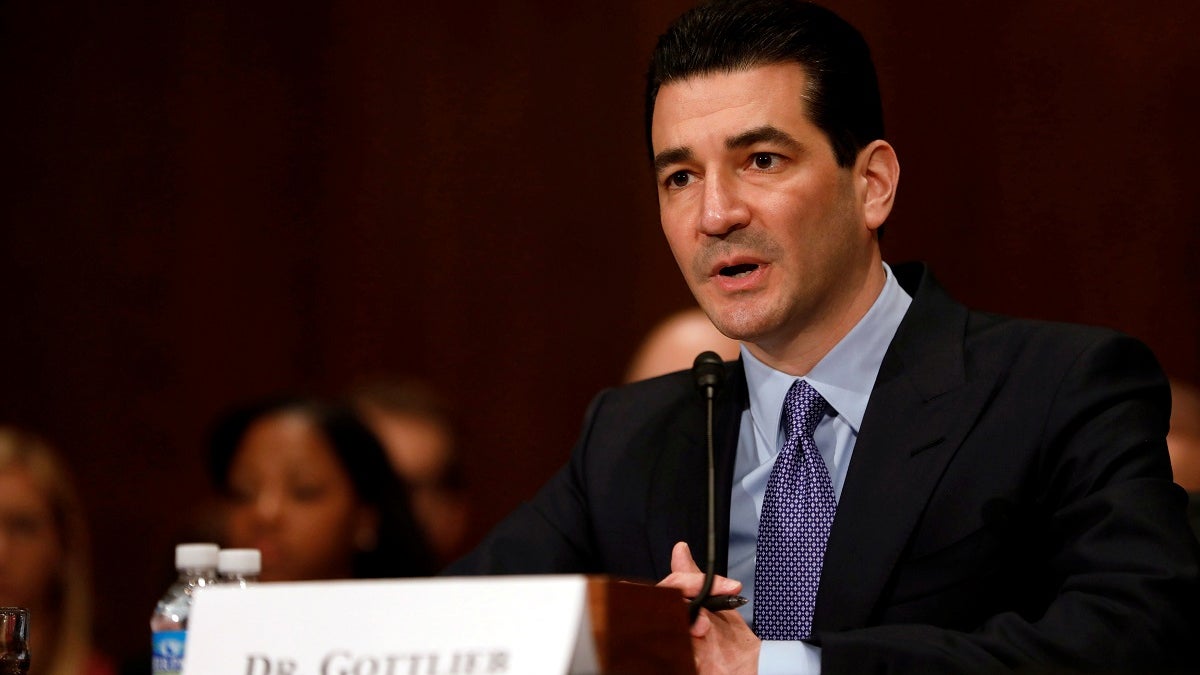
Dr. Scott Gottlieb testifies before a Senate Health Education Labor and Pension Committee confirmation hearing on his nomination to be commissioner of the Food and Drug Administration on Capitol Hill in Washington, D.C., U.S. April 5, 2017. (REUTERS/Aaron P. Bernstein)
Dr. Scott Gottlieb, President Trump’s nominee for Food & Drug Administration commissioner, did well at his hearing before the Senate Committee on Health, Education, Labor and Pensions this week. He withstood fire from Democrats over his perceived conflicts of interest with the pharmaceutical industry and the FDA’s failure to address the nation’s opioid epidemic, which he vowed will be his “highest and most immediate priority” if approved.
Regarding his ties to drug companies, Gottlieb has filed an ethics agreement stating he will recuse himself for one year from agency decisions that involve more than 20 health companies he has been connected to.
Gottlieb has been endorsed by the National Consumers League, the National Coalition for Cancer Survivorship (he is a survivor of Hodgkin’s Lymphoma), the Global Healthy Living Foundation, the Alliance for Aging Research and by former FDA Commissioners Margaret Hamburg, Robert Califf and Mark McClellan.
Based on his experience as deputy FDA commissioner during the George W. Bush administration and as an entrepreneur who founded a successful cancer biotech company, Gottlieb understands the importance of the FDA in establishing and policing successful treatments. He has written extensively about the importance of timely vaccines for dangerous diseases, including influenza.
A few weeks ago, I had breakfast with Gottlieb at a trendy spot in New York. I forgot to make reservations, so we had to grab a table by the bar — good food, but hardly exclusive. Scott has always struck me as easygoing and accommodating, and our breakfast did nothing to change that impression. We slid in beside others just as easily as we might have taken a window table in the more exclusive dining room. He instantly passed my George W. Bush test — he was just as comfortable with waitresses as with millionaires. He came across as very straightforward, and he processed information more quickly in person than in front of a TV camera.
We discussed pharmaceuticals, and it was clear that his associations informed his vast knowledge base without biasing him. He does not appear to be the kind of person or physician who would ever let anyone ply him for favors. He also displayed confidence and certainty, which will keep those who report to him from grabbing authority for themselves.
Scott Gottlieb will never be asleep at the switch. He has a history of mixing personalized, creative solutions with comprehensive data analysis. Perhaps most importantly, for a practicing physician like me, he is known to believe in sharing information about off-label uses of drugs.
Don’t get me wrong … FDA labeling is crucial. But most of us develop our greatest treatments from years of experience with off-label uses in the medical trenches. The FDA does not regulate my practice of medicine, but I would love for it to be more directly on the receiving end of what I discover from using the various treatments and medical devices they’ve approved.
As FDA commissioner, Gottlieb can also play an important role in integrating discoveries in the university setting with discoveries in the drug labs. Better communication can lead to faster approvals when appropriate, especially in keeping with the new 2016 law for that purpose.
Gottlieb said he believes in speedier review and approval of generic drugs, which could help bring down prices, but he also said most FDA regulations are “there for a reason.” In other words, speed often must be sacrificed to ensure safety. He is familiar with the issues that surround drug pricing and the role the “middleman” pharmacies play in negotiating. He has written extensively about the need for FDA transparency, including explaining why it rejects a drug.
In this day of genetically modulated immunotherapy and a future that may well hold a different health pill for each of us, it is hard to think of a candidate better suited to head the FDA than patient-and-doctor-centric Dr. Scott Gottlieb. His experiences as a cancer patient and his work as a practicing hospitalist also count. And if he acquired some of the essential tools he needs at the very source of drug creation, all the better.
Oh, by the way — we split the check.
